This Special Report is available as PDF download at the bottom of the page.
Each day Zur Rose orders 80,000 items directly from the manufacturers or wholesalers of pharmaceutical and medical products. On average, it only takes about two weeks for a complete clear-out of inventory in Zur Rose’s warehouse, with around 10,000 items on stock. So specialist knowledge and excellence in logistics are among the firm’s important core competences. These also include sector-specific expertise as a doctorsꞌ supplies wholesaler and mail-order pharmacy. The start was a simple idea: in 1993 Walter Oberhaensli, the lawyer and current CEO, wanted to establish a pharmacy on the property ꞌZur Rose,ꞌ that he had acquired in Steckborn, Switzerland, following closure of that communityꞌs only pharmacy because it had no new successor to run it.
Because initially it was not possible to find a tenant for the new pharmacy, Walter Oberhaensli joined forces with local doctors. They jointly founded the ꞌZur Roseꞌ pharmacy, also acting as a community of buyers for the founding doctors, ensuring cost-competitive supply of medication. Later, this developed into the mail-order trade in medicines. From 2001 Zur Rose began sending medicines directly to patients. The goal of guaranteeing a secure, cost-competitive, high-quality supply of medication gained positive feedback from customers, against the background of rising health-care costs. Step by step, with his persistence and specialist knowledge of the law, Walter Oberhaensli proved able to overcome legal obstacles along this path.
By taking over the mail-order pharmacy firm DocMorris in 2012, Zur Rose succeeded in further expanding its market position in Germany. By now the firm is Europe’s leading mail-order medicines supplier. Zur Rose is now employing more than 1,000 staff at its various sites and has a turnover of over CHF 880 m. in business-year 2016 (approx. EUR 808 m.). Strong growth and a variety of subsidiary companies and sites in Switzerland, Germany and the Netherlands are the Zur Rose Groupꞌs key features today. Yet even the light of the happiest success story is casting a shadow. Typically for an international company, takeovers and fast growth led to the emergence of a a heterogeneous IT landscape, with five different ERP systems and three different database systems.
Long-term heterogeneity is too costly
ꞌWhat is costly about a heterogeneous IT environment is not only the licenses. Most of all, what makes a negative impact is the staff workload on maintenance and upkeep of existing systems,ꞌ Michael Herrmann, Project Manager at Zur Rose Suisse, emphasizes. ꞌTo this day, all our ERP systems are hosted internally, meaning that we also have to take care of the infrastructure. It uses a lot of resources to take care of the various software solutions and to master the resulting complexity. Long term, in the era of cloud computing and new software generations, a situation like this is not what we want.ꞌ
Therefore Zur Rose decided in 2015 to reshape its IT landscape. The guiding principles were modernization and centralization. The new generation, S/4 Hana, was chosen as the future integrated ERP system; this can visually present the Zur Rose Groupꞌs planned level of growth, also over the long term. ꞌThis decision also offers the opportunity to present, visually and uniformly, the processes involved in administering orders and in purchasing, both for B2B and B2C business; these are now still running on different ERP systems,ꞌ Michael Herrmann explains.
Safety and data security
For many years now, hardly any business sector has been regulated as strictly and comprehensively as healthcare. For mail-order supply of medicines, what is decisively important is safety in their supply. Therefore, the law has for a long time demanded end-to-end tracing of production batches and required retention periods for patient files, which can span several decades. ꞌThis special situation led to our company having a very high degree of digitization in our processes, long before that term became the latest buzz-word,ꞌ Michael Herrmann notes. ꞌFor a long time now, faxes or other correspondence with business partners have been systematically archived digitally. As a result, our systemsꞌ data-storage volume is large – another reason for switching to the planned central ERP system.ꞌ
Solution for the legacy systems
You may wonder: what about the legacy systems? The various rules that govern data storage and the rules on documentation mean that users must also be able to make evaluations in the future, if needed. So the business logic of the ERP systems used until now must be retained. ꞌIt does go through a user’s mind to conclude that, as part of a centralization, the legacy systems should simply be switched off, but in practice this is no easy problem to solve. On central modernization projects, this issue is in fact the Achilles heel with regard to introducing a new software generationꞌ, Michael Herrmann points out.
Therefore, paralleling the decision to migrate to S/4 Hana, Michael Herrmann and his team were seeking a central solution for archiving the stock of data and documents that formed the legacy systems that were to be replaced. These also needed to offer the possibility of definitive deletion of data, a functionality that the EU’s new General Data Protection Regulation (GDPR) demands. Of course, running the new solutions must be more cost-competitive, on a lasting basis, than the workload involved in taking care of the legacy systems. ꞌAnyone getting a market overview soon realizes that the number of solution providers in this area is limited. A service provider that perfectly matches Zur Rose’s requirements is the Swiss firm Data Migration Services, with its JiVS platform,ꞌ Herrmann explains.
The JiVS platformꞌs first test of strength comes this spring, as soon as the first phase is over for switching to a central SAP system in the areas of master data and purchasing. Then part of the data and documents will be migrated away from the ERP system and onto the new platform. This means several billion data sets or around half the total data volume. ꞌThis type of archiving is about much more than long-term storage in reliable archives. After all, the data and documents remain ꞌalive,ꞌ to some degree, and part of our processes. That is why, like the original producer, we speak of application retirement, rather than archiving,ꞌ Michael Herrmann adds. For instance, this means that, over decades, users can trace which patient got which medication and from which production batch this originated. JiVS is implemented by T-Systems Data Migration Consulting, the largest partner of Data Migration Services. This Swiss subsidiary of T-Systems is responsible for migration of the stock of data and documents, taking over operation of the JiVS platform in Zur Roseꞌs datacenter in Switzerland.
Room for innovations
In the next three to five years, the legacy systems are to be shut down. ꞌAll in all, what we expect from this is six-digit savings on running costs. We are also taking it as our starting point that the purging of duplications will lower the storage volume used, by around 30 per cent,ꞌ Michael Herrmann is happy to note. ꞌBut the most important thing is that we will hugely reduce complexity in our IT. This lays the necessary foundation for further growth and for putting innovative solutions into practice in the future.ꞌ
Continue reading by clicking on the arrow on the right side of the screen.



















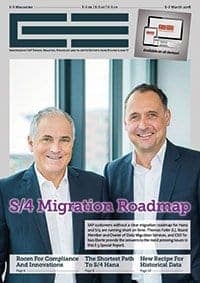
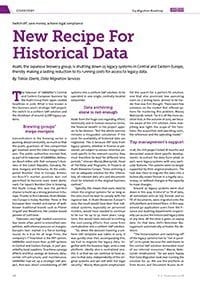
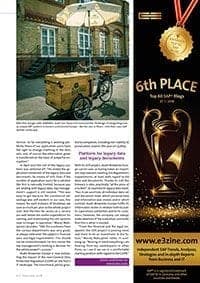

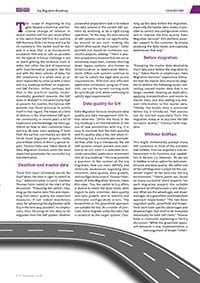
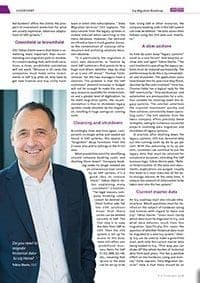
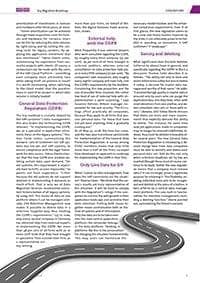
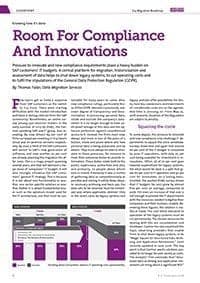
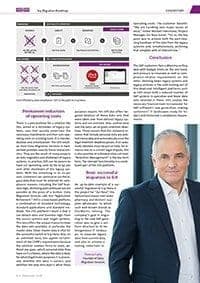
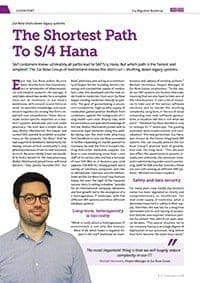
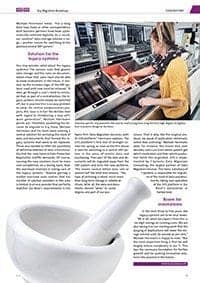


Add Comment